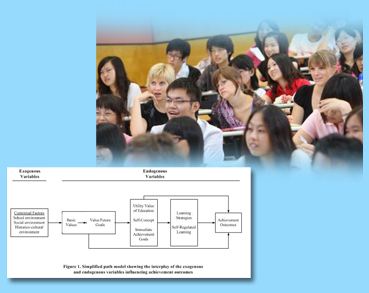 |
 |
| |
Selected Research Project |
| |
 |
| Project Title |
Optimizing the Potential of Hong Kong Students: Harnessing the Interaction between Psychological Variables and Student Achievement |
|
| |
| Principal Investigator |
Professor Dennis McInerney |
|
| |
| Area of Research Project |
Teaching and Learning |
|
|
|
|
| |
| Project Period |
|
|
| Objectives |
-
To examine the nature of and inter-relationships between psychological variables, and how they are related to academic outcomes;
-
To understand the pattern of change (or stability) of students' psychological variables as students progress to higher grades, and the implications of this pattern for curriculum, policy, and practice;
-
To identify the contribution of psychological variables at the individual, classroom, and school levels to the academic outcomes of students;
-
To disentangle the causal influence of multiple psychological variables on academic outcomes; and
-
To synergistically combine recent advances in research in order to identify new approaches for enhancing students' psychological characteristics, which should result in optimized academic outcomes.
|
 |
|
| Methods Used |
The research design comprises a multi-cohort–multi-occasion 3-year quantitative longitudinal study of 8,354 S1 to S3 students from 16 secondary schools. The sample is representative in terms of geographical location and school type. Three waves of data were collected each year over three years (2010–2012), and are currently being analysed. Measurement instruments consist of 7 pre-existing Likert-type scales that were back-translated, validated, and enhanced before application. The quantitative data are analysed using multi-trait–multi-method analysis, structural equation models, and multi-level growth models of longitudinal data.
|
|---|
| Summary of Findings |
The basic values, valued future goals, immediate achievement goals, self-concept, and the perceived instrumental value of education are important factors influencing the learning strategies, self-regulation, and, ultimately, achievement outcomes of students.
- Through theory building, an evidence-based model is developed on the effect over time of psychological variables on school achievement of Hong Kong secondary students.
- Insights are gained regarding both cross-sectional and growth patterns of key variables of the self and motivation of Hong Kong secondary students.
|
Impact |
|
This study will make a major contribution to both theoretical and applied knowledge by testing the model and its components among Hong Kong students, and evaluating whether these components have construct and predictive validity and heuristic value for understanding engagement with and success at school of Hong Kong students. Through theory building, an evidence-based model will be developed on the effect over time of psychological variables on school achievement of Hong Kong secondary students. Insights will be provided into both cross-sectional and growth patterns of key self-variables and motivation of Hong Kong secondary students. Furthermore, critical information will be provided for educators regarding how they may develop programs to enhance the motivation and learning of all students, across gender, grade, and ability levels within Hong Kong secondary schools.
|
Selected Publications Related to the Study |
-
McInerney, D. M. & Van Etten, S. (2004). Big theories revisited. In D. M. McInerney & S. Van Etten (Eds), Research on Sociocultural Influences on Motivation and Learning, Vol. 4. Big Theories Revisited. Greenwich, CT: Information Age.
- Marsh, H. W., Craven, R., & McInerney, D. M. (2008). Advances in Self Research. Vol. 3. Self-Processes, Learning, and Enabling Human Potential: Dynamic New Approaches. Charlotte, NC: Information Age.
- McInerney, D. M. (2004). A discussion of future time perspective: Contemporary Research. Educational Psychology Review, 16, 141–151.
- Wigfield, A., Tonks, S., & Eccles, J. (2004). Expectancy-value theory in cross cultural perspective. In D. M. McInerney & S. Van Etten (Eds.), Research on Sociocultural Influences on Motivation and Learning. Vol. 4. Big Theories Revisited (pp. 165–198). Greenwich, CT: Information Age.
- Maehr, M. L. & McInerney, D.M. (2004). Motivation as Personal Investment. In D. M. McInerney & S. V. Etten (Eds.), Big Theories Revisited. (pp.61-90). Greenwich, CT: Information Age.
- Watkins, D., McInerney, D. M., Lee, C., Akande, A., & Regmi, M. (2002). Motivation and learning strategies. A cross-cultural perspective. In D. M. McInerney & S. Van Etten (eds.), Research on Sociocultural Influences on Motivation and Learning, Vol. 2. Greenwich, CT: Information Age. pp 329–343.
- McInerney, D. M. (2007). The motivational roles of cultural differences and cultural identity in self-regulated learning. (Invited) In D. Schunk & B. Zimmerman (Eds.), Motivation and Self-regulated Learning: Theory, Research, and Applications. New York: Lawrence Erlbaum.
|
| Biography of Principal Investigator |
|
Dennis McInerney is Chair Professor of Educational Psychology and Associate Vice President (Research and Development). He is Co-director of the Assessment Research Centre.
Prior to his current position, he was Research Professor and Associate Dean (Education Research) at the National Institute of Education, Nanyang Technological University, Singapore having served for a period as Vice Dean (Research and Methodology) within the Centre for Research in Pedagogy and Practice. Professor McInerney also served as Research Professor and Associate Director of the Self Research Centre at the University of Western Sydney.
Professor McInerney has published over 200 research articles in refereed international journals, books, and conferences. He edits two international research series, Research on Sociocultural Influences on Motivation and Learning (Vols. 1–9) and International Advances in Self Research (Vols. 1–3). He has received numerous research grants, including seven Australian Research Council grants and two Hong Kong RGC GRF grants. He was awarded the University of Western Sydney’s Senior Researcher Award and was the first Professor to receive a Personal Chair at the University of Western Sydney, MacArthur.
|
Funding Source |
General Research Fund |
|
|
|
 |
|
 |


